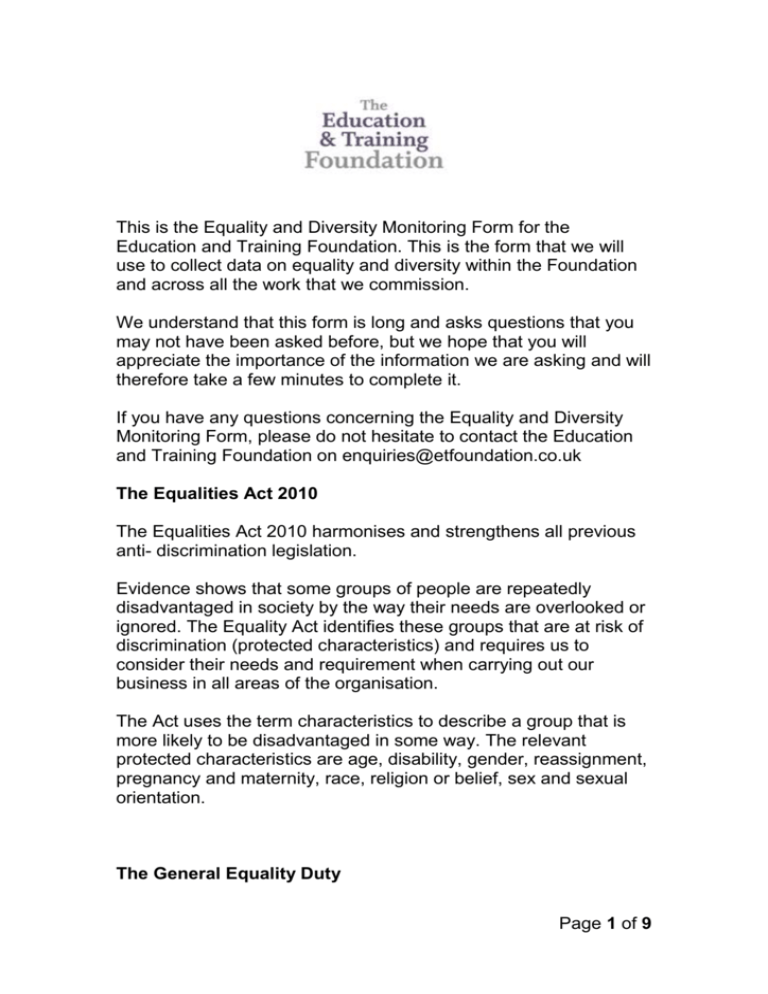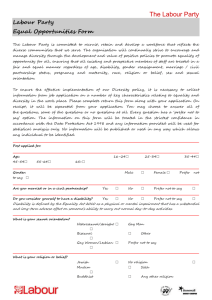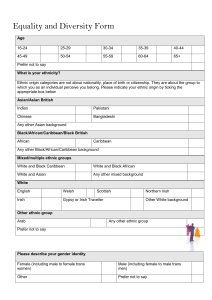Equalities-and-Diversity-form
advertisement

This is the Equality and Diversity Monitoring Form for the Education and Training Foundation. This is the form that we will use to collect data on equality and diversity within the Foundation and across all the work that we commission. We understand that this form is long and asks questions that you may not have been asked before, but we hope that you will appreciate the importance of the information we are asking and will therefore take a few minutes to complete it. If you have any questions concerning the Equality and Diversity Monitoring Form, please do not hesitate to contact the Education and Training Foundation on enquiries@etfoundation.co.uk The Equalities Act 2010 The Equalities Act 2010 harmonises and strengthens all previous anti- discrimination legislation. Evidence shows that some groups of people are repeatedly disadvantaged in society by the way their needs are overlooked or ignored. The Equality Act identifies these groups that are at risk of discrimination (protected characteristics) and requires us to consider their needs and requirement when carrying out our business in all areas of the organisation. The Act uses the term characteristics to describe a group that is more likely to be disadvantaged in some way. The relevant protected characteristics are age, disability, gender, reassignment, pregnancy and maternity, race, religion or belief, sex and sexual orientation. The General Equality Duty Page 1 of 9 There is now one General Equality Duty with a focus on output rather than input. The General Equality Act is to have due regard to the need to: Eliminate unlawful discrimination, harassment and victimisation Advance equality of opportunity between different groups, and Foster good relations between different groups Having due regard means consciously thinking about the three aims of the general duty as part of the process of normal business decision making; removing disadvantage; and encouraging participation and success. The term foster means tackling unlawful discrimination and promoting relations between different groups of people. Specific Responsibilities The Specific Responsibilities (statutory regulations 2011) require us to publish: By January 2011 and annually thereafter: sufficient information to show we have considered and complied with the three aims of the General Duty of Care By 6th April 2012 and renewed at least every four years thereafter evidence based SMART equality objectives that will help us further the aim of the General Duty . Information in such a manner that it is accessible to the public Our Statement of Commitment to Equality, diversity and Inclusion The Education and Training Foundation values equality and diversity highly, challenges inequality and takes active steps to provide an inclusive environment for our staff and visitors irrespective of their age, disability, gender, gender reassignment, marriage or civil partnership, pregnancy or maternity, race, religion or belief or sexual orientation. Page 2 of 9 1. We value diversity highly, recognising that different people bring different ideas, histories, knowledge and culture and that this difference brings great strength which improves the quality of the Foundations work. 2. We challenge inequality, understanding that patterns of inequality in society are also reflected in organisations and that difference in outcomes for the recipients of our work and staff should be challenged by all of us and addressed through a multiple of strategies including lawful positive action. 3. We ensure an inclusive environment; knowing our staff, customers and visitors will want to work and visit us if we respect the rights of individuals and groups to hold their own views and values, but will not tolerate these to be presented in a way that intimidates, degrades or is hostile to others. Equalities Form The aim of requesting and analysing this information is to improve our understanding of the make-up of the workforce in the sector, including barriers to access. We recognise that you may feel that the information requested is sensitive. Completion of this questionnaire is entirely voluntary. Neither the act of collecting this information nor any of the questions is intended to cause offence. An option to ‘prefer not to answer’ is included for every question. This form includes equalities questions relating to the 9 protected characteristics (Equality Act, 20101), work patterns, flexible working2, caring responsibilities3 and social mobility4. While there is no legal requirement to monitor the latter categories, they are include as good practice and the data gathered will be used to inform the Foundation’s future programmes. The questions are a combination of categories used by the Office for National Statistics (ONS) in the 2011 Census for England, 1 EHRC http://www.equalityhumanrights.com/legal-and-policy/equality-act/ (accessed 14 January 2014) 2 Gov.UK Flexible working https://www.gov.uk/flexible-working (accessed 14 January 2014) 3 Civil Service (2012) Best practice guidance on monitoring equality and diversity in employment. Civil Service. 4 Spada (2012) The Social Mobility Toolkit. Spada. Page 3 of 9 Wales, Scotland and Northern Ireland, Civil Service guidance (2012), Professions for Good (2012), and in seeking to take a progressive approach to emerging good practice, international border agencies’5 and best practice promoted by external equality and diversity organisations such as Gires (2013)6, The Scottish Transgender Alliance7 and the Forum for Sexual Orientation and Gender Identity8. Rationale Desire to ensure that the sector workforce – including its leaders - reflects the diverse communities we serve, therefore we need to know to what extent our sample is reflective of this Increase information about and awareness of these issues with a view to informing Foundation policy, decisions and accountability Published sector workforce data has in the past identified unequal opportunities and particular social barriers to progression, promotion and leadership roles for some protected groups. For other protected groups we do not yet have sufficient and/or robust sector data to draw conclusions To ensure that opportunities in the sector are accessible to all and do not exclude or disadvantage any particular group Will result in the Foundation commissioning programmes and opportunities that will attract and support the development of diverse, talented and motivated workforce in the education and training workforce Any information provided on this form will be treated as strictly confidential and will be used for statistical purposes only No information will be published or used in any way that allows an individual to be identified Analysis 5 For example, (2014) http://www.passports.govt.nz/Transgender-applicants (accessed 29 January 2014). The UK border agency is expected to make similar progress next year. 6 GIRES (2013) Monitoring gender nonconformity – a quick guide. Access via http://www.gires.org.uk/monitoring.php 7 The Scottish Transgender Alliance http://www.scottishtrans.org/wpcontent/uploads/2013/01/A-Practical-Guide.pdf (accessed 14 January 2014) 8 The Forum for Sexual Orientation and Gender Identity (2013) Newsletter 7 at: https://sgforum.org.uk/ (accessed 14 January 2014). Page 4 of 9 First cut data analysis will be by single protected characteristics Second cut analysis will be multivariate - looking for patterns to help us to explain and understand findings from the first cut Where gaps/issues are identified through analysis the leadership conversation will include opportunities to find out more in the forthcoming virtual brainstorming activity and will make recommendations to the Foundation where further targeted investigation and/or programmes of activity may be required in order to ensure equality of opportunity across protected and other social groups Age 16-24 25-29 45-49 50-54 30-34 3539 40 44 55-59 6065 64 + Prefer not to say How would you describe your national identity? English Welsh Scottish Northern Irish British Other Prefer not to say What is your ethnicity? Ethnic origin categories are not about nationality, place of birth or citizenship. They are about the group to which you as an individual perceive you belong. Please indicate your ethnic origin by ticking the appropriate box below Asian/Asian British Indian Pakistani Chinese Bangladeshi Any other Asian background Black/African/Caribbean/Black British African Caribbean Any other Black/African/Caribbean background Page 5 of 9 Mixed/multiple ethnic groups White and Black White and Black African Caribbean White and Asian Any other mixed background White English Welsh Scottish Northern Irish Irish Gypsy or Irish Traveller Other White background Other ethnic group Arab Any other ethnic group Prefer not to say Please describe your gender identity Female (including male Male (including female to female trans women) to male trans men) X Other Prefer not to say Is your gender identity different to the sex you were assumed to be at birth? Yes No Prefer not to say Pregnancy and maternity – as a woman, are you pregnant, on maternity leave or returning from maternity leave? Yes No Prefer not to say Do you consider yourself to be Deaf or disabled? Section 6(1) of the Equality Act 2010 states that a person has a disability if: (a) That person has a physical or mental impairment, and (b) The impairment has a substantial and long-term adverse effect on that person’s ability to carry out normal day-to-day activities. Yes No Prefer not to say If yes, please tick all that apply Deaf Hard of hearing Learning difficulties Page 6 of 9 Manual dexterity difficulties Blind/partially sighted Mental health problems Progressive medical condition Mobility difficulties Speech difficulty Facial disfigurement Long-term illness/medical condition Prefer not to say What is your sexual orientation? Heterosexual/straight Gay woman/lesbian Gay man Bisexual Questioning/undecided Other Prefer not to say What is your religion or belief? No religion Buddhist Hindu Jewish Sikh Rastafarianism Atheism No beliefs Christian Muslim Any other religion Non-religious philosophy/belief-based lifestyle choices Prefer not to say Did any of your parent(s) or guardian(s) complete a university degree course or equivalent (e.g., BA, BSc or higher)? Yes No I don’t know Prefer not to say What type of school did you mainly attend between the ages of 11 and 16? A non-selective state-run or state-funded school A selective (on academic, faith or other ground) state-run or state-funded school Independent or fee-paying school Attended school outside the UK I don’t know Prefer not to say Which of the following qualifications do you hold to date? (tick all that apply) 1-4 O levels/CSEs/GCSEs (any grades), Entry Level, Foundation Diploma NVQ Level 1, Foundation GNVQ, Basic Skills Page 7 of 9 5 or more O level passes/CSEs (grade 1)/GCSEs (grades A* to C), School Certificate, 1 A level/ 2-3 AS levels/VCEs, Higher Diploma NVQ Level 2, Intermediate GNVQ, City and Guilds Craft, BTEC First/General Diploma, RSA Diploma Apprenticeship 2 or more A levels/VCEs, 4or more AS levels, Higher School Certificate, Progression/Advanced Diploma NVQ Level 3, Advanced GNVQ, City and Guilds advanced craft, ONC, OND, BTEC National RSA Advanced Diploma Undergraduate degree (e.g., BA, BSc) Master’s degree (e.g., MA, MSc) Doctorate degree (e.g., PhD) NVQ level 4-5, HNC, HND, RSA Higher Diploma, BTEC Higher Level Professional qualifications (e.g. teaching, nursing, accountancy) Other vocational/work-related qualifications Non-UK qualifications No qualifications Prefer not to say Did either (or both) of the following apply at any point during your school years? Your household received income support Yes No I don’t know Prefer not to say You received free school meals Yes No I don’t know Prefer not to say What is your current working pattern? Full-time Part-time Prefer not to say Are you married or in a civil partnership? Yes No Prefer not to say What is your flexible working arrangement? (tick all that apply) None Flexi-time Staggered hours Term-time hours Annualised hours Job share Page 8 of 9 Flexible shifts Homeworking Compressed hours Other Prefer not to say Do you have caring responsibilities? If yes tick all that apply None Primary carer for a Primary carer for disabled child/children (under 18) child/children (under 18) Primary carer for disabled Primary carer for an older adult (18 and over) person (65+) Secondary carer Prefer not to say Thank you for completing the form Page 9 of 9





